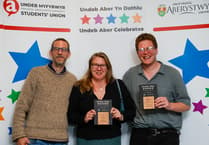A new study by an Aberystwyth University historian is set to look at why disparate parts of Europe came up with common narratives over 800 years ago.
Working from texts produced across Europe over a 200-year period, Prof Björn Weiler from the Department of History and Welsh History will explore a phenomenon that saw communities write their stories and tell of the superior attributes which they saw as setting them apart from their immediate neighbours.
A historian of medieval Europe, Prof Weiler’s sources will include letters, chronicles, saints lives as well as architecture and archaeological finds.
The project is funded by a Major Research Fellowship from the Leverhulme Trust.
“During three distinct periods – the years 1100 to 1130, 1180 to 1210 and 1250 to 1280 – different regions in Europe set about writing their histories and what made them stand out,” said Prof Weiler.
“These stories were developed independently of each other, yet their authors came up with similar mechanisms and ideals for writing about the distinctiveness of their communities.
“Why was it that people in Denmark, Poland or Norway all started writing the history of their communities in pretty much the same way, at pretty much the same time, and for whom?
“What is intriguing about is that all these writings link back to Rome, or at least to Antiquity, to the same ideas and the same expectations as to what a community should be.
“The ideals are both political and cultural, and to some extent always conform to a Europe-wide idea.
“So the Danes are distinctive because they are the best Christians, the most war-like, superior even to the Romans. The Poles are the best Christians because they are the most war-like, the most educated, and so on.”
See this week’s south papers for the full story, available in shops and as a digital edition tomorrow




